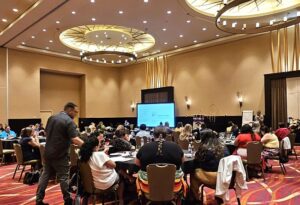Anishinabek Nation hosts Family Well-Being Conference focused on community safety

By Victoria Racette
CHIPPEWAS OF RAMA FIRST NATION – The Anishinabek Nation Social Development Department organized and hosted a two-day hybrid Family Well-Being Conference from June 25-26, 2024, at Casino Rama in Chippewas of Rama First Nation.
The Conference – Cultivating Resilience in Families and Strengthening Community Safety – focused on family and community safety across the Anishinabek Nation’s 39 member First Nations.
“This event [was] designed to empower, build, and support communities and families through knowledge and tools to enhance overall well-being,” said organizer Tracy Robinson, Family Well-Being Development Worker.
Over the course of the two-day Conference, participants were introduced to strawberry teachings, WrapAround Training, strengths and safety needs for neurodivergence, self-care activities, community safety and policing, including a newly launched drug initiative and human trafficking.
“Participants of this Conference consisted of family well-being workers and those filling a family well-being role within member Anishinabek First Nations,” added Robinson. “They had the opportunity to learn from leading experts in policing, hear the lived experience of a survivor as she shared her story and insight on human trafficking, and engage in interactive training and cultural and self-care related activities.”
A major component of the Conference was WrapAround Training. Together, Wrap Canada’s Board Chair Mark Vander Vennen, and Facilitator Patrick King provided an interactive introduction to WrapAround Training – “a person/family driven, team-based planning process that develops an individualized plan that uses the strengths [of those involved] to develop strategies that effectively address [their] needs on a day to day basis”. Upon completion of day two, all participants received a certificate from Wrap Canada.
“[I will] use concepts of WrapAround to enhance strength-based communication with families,” said one participant. “I really enjoyed the two days!”
On day two, the Conference hosted Jasmine Scott (De Fina), a recognized expert in human trafficking with significant experience educating frontline workers, government leaders, law enforcement, community agencies, and the court system and public to provide insight into the issue of human trafficking and information on how to better understand, support, and work with survivors.
The Conference also featured presentations by two members of the Anishinabek Police Service. Sergeant Chantal Larocque, an ambassador to reconciliation efforts with her policing approach(es), presented on community safety and policing. Detective Constable Matti Primeau, a member of the Intelligence-Led Joint Forces Strategy (ILJFS) investigating human trafficking cases across the province, presented on safety and human trafficking.
In-person and online participants of the Conference received a safety-focused swag bag, including resourceful items to help in an emergency or crisis situation. The Anishinabek Nation’s Social Development Department also partnered with the organization’s Reconciliation Department to provide custom strawberry beading kits for cultural connection and self-care. Designed by Anishinabek Nation Reconciliation Navigator Suzanne Goulais-Deering with assistance from Communications Coordinator Priscilla Goulais, the beading kits were a standout addition to the Conference activities.
“Reconciliation is not simply associated with the missing children and unmarked burials of Residential Schools, [it] is in all areas – it is reconciling the colonial legacies in child welfare, family well-being, health, and in government. It is so fulfilling to be able to support other Anishinabek Nation departments [in the work that we do],” shared Anishinabek Nation Reconciliation Manager Kelsey Anger.
At the Conference, Fetal Alcohol Spectrum Disorder (FASD) Manager Michelle Irvine, and FASD Worker Chochi Knott from the Anishinabek Nation’s Health Department also shared valuable information around neurodivergence. Their presentation helped connect the safety needs of neurodivergent children and youth, while demonstrating the need for compassion and knowledge in understanding the individual uniqueness of neurodivergence as a frontline worker. As a self-care activity, Irvine and Knott engaged the audience in creating traditional medicine pouches.
“Exploring the pillars of resiliency, safety, and community, we heard powerful stories of overcoming adversity, learned innovative strategies and tools to further ensure safety and well-being, and strengthened our collective commitment to foster supportive and inclusive communities,” expressed Robinson. “Collaboration is key to making the most of the resources within each community – building a network of support that will continue to grow and thrive beyond this Conference.”


